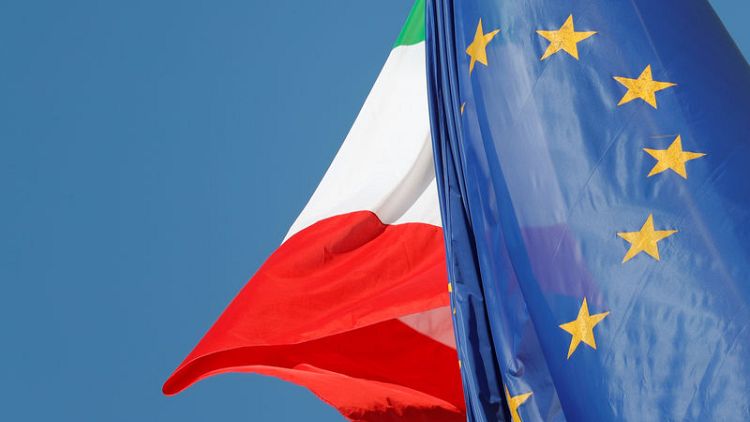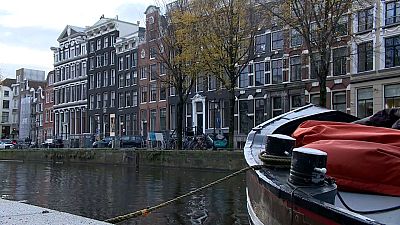By Jan Strupczewski
BRUSSELS (Reuters) - An uncompromising challenge to EU budget rules by Italy is providing the first big test for reforms introduced to save the euro zone nine years ago as financial crisis threatened to tear it apart.
The reforms remain a work in progress, and in urgent need of fuller implementation before the bloc's next crisis strikes.
But the defiance from Rome that has locked it into an unprecedented standoff with Brussels - and given fresh legs to a discredited image of financially responsible northern euro zone nations pitted against a profligate south - seems certain to delay that process and probably dilute it for good.
In May 2010, the then 16 countries sharing the euro clubbed together to create a rescue fund whose first task was to save Greece from going bust.
The ensuing bailout programme, only concluded in August when the country exited its third rescue package, produced a consensus that closer economic cooperation was needed to better protect the system against future shocks.
With that in mind, euro zone states are now moving towards giving their bailout fund new powers of economic monitoring.
They also aim to strengthen a second fund designed to protect the banking system, extend national guarantee schemes for bank deposits across the whole currency bloc and introduce a euro zone budget.
Germany and its neighbours insist that, before they take on more bloc-wide financial commitments, financial risks within it must be substantially reduced.
But as a populist government in debt-laden Italy lays out plans to spend more borrowed money in clear contravention of EU rules, the deposit scheme and euro zone budget are becoming a more distant prospects.
"It is going to be more difficult now. When you talk about deposit insurance, the appetite is smaller. Italy is an additional argument not to even think about it," one senior euro zone official said.
The EU is due to present the next phase of the integration package in December - and officials expect it to underwhelm.
"We are still heading for some minimalist package of reforms. We are going to get some ESM (bailout fund) strengthening, we are going to get the backstop to the Bank Resolution Fund and not a lot more," a second senior official said.
"The idea of a euro zone fiscal capacity does not seem to have a lot of viability, I am sceptical whether it will translate into something in reality," the second official said.
DISCIPLINE BY MARKETS
Italy's refusal to keep in check its bloated public finances also ruins the positive impression that southern countries - notably the bloc's third sovereign bailout recipient Portugal - made with reforms that helped counter the German focus on more fiscal discipline.
And it might bring back discussions, championed by Berlin, about setting up a debt restructuring mechanism for countries that lose market access - a fate that could theoretically befall Italy if investors begin to doubt its ability to repay a debt pile equivalent to 133 percent of GDP.
"My fear is that because of the situation in Italy, Germany can say that market discipline is a good thing because the (EU) Commission cannot enforce the rules," a third official said.
"Maybe this can also start to convince France, if we have countries that deliberately break the rules and don't really care about the Stability and Growth Pact (on fiscal discipline) any more," he said.
But while officials agree that ultimately only the markets hold the power to force Italy to change its fiscal policy - a view shared by the government in Rome - leaving it only to investors to exert pressure could be dangerous.
"The markets will discipline irresponsible behaviour, but they do it very late and they do it in a very extreme way," the second official said.
The Pact requires governments to cut their structural deficits, which exclude one-offs and business cycle swings, every year until the books are balanced. Public debt must be cut every year too.
If they don't, the Commission can start disciplinary steps that can end in fines -- a prospect Rome now faces if it ignores the Commission's demand to change the 2019 budget so that the structural gap falls rather than rises.
Italy has no supporters among other euro zone governments.
But with the challenge to Brussels having enhanced the popularity of ruling coalition heads Matteo Salvini and Luigi Di Maio among domestic voters, it is still unlikely to yield.
Unless markets force them to, they certainly have no incentive to back down before European Parliament elections in May, officials believe.
This makes the current clash far more dangerous for Brussels and supporters of closer economic integration than previous spats over fiscal policy with France, Spain or Portugal, or indeed previous Italian administrations, a fourth official said.
"In the past, we had to deal with governments breaking EU rules but at least willing to cooperate. In the case of Italy, we have an uncooperative government," the official said.
(Reporting By Jan Strupczewski; editing by John Stonestreet)



